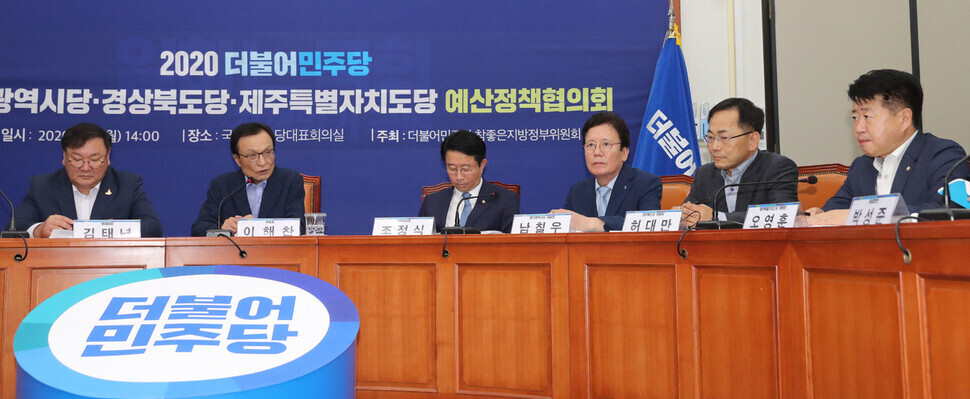hankyoreh
Links to other country sites 다른 나라 사이트 링크
Support for Moon and Democratic Party slipping in aftermath of scandals and real estate controversy
Defection of supporters in 30s and 40s and women more severe than ever before

South Korean President Moon Jae-in’s current approval rating is 44.8%, which doesn’t sound so bad, considering he has two years left in office. The problem is the situation he’s in and the speed at which his ratings are slipping. Not long ago, Moon’s approval rating shot up to 70%, buoyed by his administration’s successful fight against the COVID-19 pandemic. But now his approval is overshadowed by disapproval.
Furthermore, the once-fragmented opposition party has boosted its support and is now neck and neck with the ruling Democratic Party. And all that has happened less than a hundred days after the ruling party’s smashing victory in the parliamentary elections in Moon’s fourth year in office, a time when the ruling party tends to get trounced. There’s also reason to believe public discontent isn’t solely due to transient factors such as the spike in real estate prices and a series of sexual harassment scandals that have embroiled local government leaders in the ruling party.
A Real Meter poll of 2,516 voters around the country released on July 20 found that Moon’s approval rating had dropped 3.9 points from the previous week to 44.8%. Conducted on July 13-17 at the request of YTN, the poll had a reliability of 95% with a margin of error of plus or minus 2 percentage points.
Moon’s current approval rating is the lowest it’s been since the second week of October 2019, when it stood at 41.4%. Negative views of his job performance rose 4.5 points over the past week to 51.0%, outweighing approval. A similar trend was evident in party support, with the ruling Democratic Party at 35.3% and the main opposition United Future Party (UFP) at 31.0% — the smallest margin between the two since the UFP’s establishment in February.
Ruling party figures are worried about the defection of key segments of their base. In this poll, the party lost support from women (6.6 points) and people in their 30s (14.4 points) at a higher rate than the overall decline (3.9 points). The shocking suicide of late Seoul Mayor Park Won-soon amid allegations of sexual harassment and the Democratic Party’s feckless response seem to have had a direct impact on the party’s female supporters, while the real estate woes have had a similar effect on people in their 30s, who dominate the housing market.
“Our support from people in their 30s and 40s has never been shaken before, but this time around there’s been a disturbing defection from people in their 30s. For now, our only option is to take quick action to counteract negative factors and to shore up our wavering base by getting tangible results through reform,” said a source in the ruling party.
“The current crisis is different from what we’ve seen at the tail end of previous administrations: it’s not due to stonewalling by the opposition but to the self-destructive behavior of the ruling party. Political arrogance and ethical vulnerability are exacerbating the crisis,” said Yu Chang-seon, a political commentator.
By Kim Won-chul and Noh Hyun-woong, staff reporters
Please direct comments or questions to [english@hani.co.kr]

Editorial・opinion
![[Column] Season 2 of special prosecutor probe may be coming to Korea soon [Column] Season 2 of special prosecutor probe may be coming to Korea soon](https://flexible.img.hani.co.kr/flexible/normal/500/300/imgdb/original/2024/0426/3317141030699447.jpg) [Column] Season 2 of special prosecutor probe may be coming to Korea soon
[Column] Season 2 of special prosecutor probe may be coming to Korea soon![[Column] Park Geun-hye déjà vu in Yoon Suk-yeol [Column] Park Geun-hye déjà vu in Yoon Suk-yeol](https://flexible.img.hani.co.kr/flexible/normal/500/300/imgdb/original/2024/0424/651713945113788.jpg) [Column] Park Geun-hye déjà vu in Yoon Suk-yeol
[Column] Park Geun-hye déjà vu in Yoon Suk-yeol- [Editorial] New weight of N. Korea’s nuclear threats makes dialogue all the more urgent
- [Guest essay] The real reason Korea’s new right wants to dub Rhee a founding father
- [Column] ‘Choson’: Is it time we start referring to N. Korea in its own terms?
- [Editorial] Japan’s rewriting of history with Korea has gone too far
- [Column] The president’s questionable capacity for dialogue
- [Column] Are chaebol firms just pizza pies for families to divvy up as they please?
- [Column] Has Korea, too, crossed the Rubicon on China?
- [Correspondent’s column] In Japan’s alliance with US, echoes of its past alliances with UK
Most viewed articles
- 11 in 5 unwed Korean women want child-free life, study shows
- 2AI is catching up with humans at a ‘shocking’ rate
- 3[Column] Has Korea, too, crossed the Rubicon on China?
- 4[Column] Season 2 of special prosecutor probe may be coming to Korea soon
- 5Division commander ordered troops to enter raging flood waters before Marine died, survivor says
- 6[Photo] More Sewol paintings by Hong Sung-dam
- 7Court dismisses comfort women’s suit against government for signing 2015 agreement with Japan
- 8[Editorial] Seoul’s callous response to disability rights protests
- 9Netflix imperialism: Are Korea’s days as the platform’s favorite content creator numbered?
- 10Marriages nosedived 40% over last 10 years in Korea, a factor in low birth rate